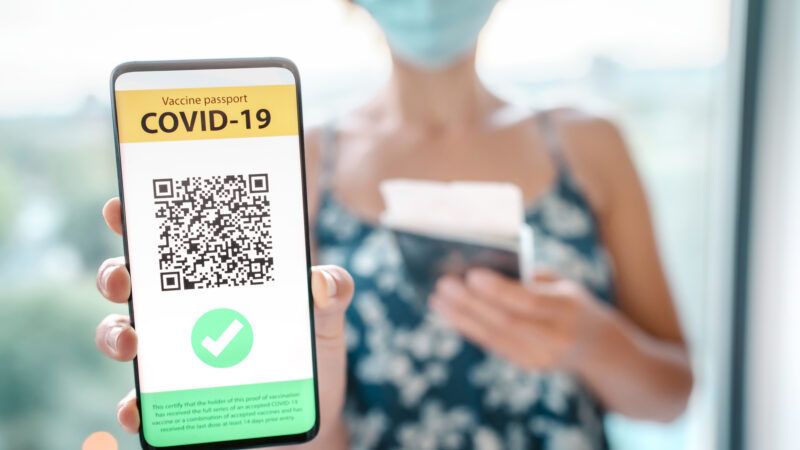Vaccine Passports Should Be Neither Mandatory Nor Forbidden
Pro-freedom politicians want to restrict private enterprise, while civil liberties proponents want to violate your bodily autonomy.

The loudest, most extreme voices in the room tend to get the most attention, which is why the debate over vaccines and vaccine mandates seems to be between a group of people—including legislators and governors who claim to support limited government— who insist that not even private businesses should be allowed to require proof of vaccination for service or employment, versus another group of people—including leaders from the nation's preeminent civil liberties organization—who say the government should be able to mandate vaccines for everyone.
Though it receives far less attention, there is another position on this spectrum: Individuals and private parties should be permitted to adopt whatever rules they please, but the government should refrain from mandating that people inject something into their bodies.
Were we living in a different timeline, Republican politicians would likely have been first in line to agree with the former point. Freedom of association was, at one point, a core tenet of conservative ideology. Yet it has been Florida and Texas—the states culturally hailed as havens for limited government—that have made it illegal for private actors to make personal decisions on whether or not to do business with unvaccinated individuals.
A Florida Department of Health rule will punish businesses with $5,000 fines should they ask to see proof of vaccination from customers, who, I should note, are still free to go elsewhere. In June, Texas Gov. Greg Abbott signed a law prohibiting anyone from requesting proof of vaccination when conducting free enterprise. One wonders how free it can be if the enterprising individuals are not permitted to control the environment in which they do business.
"It cannot be rationally justified," Timothy Sandefur, vice president for litigation at the Goldwater Institute, told me in June. "It's simply a matter of people saying that the government shouldn't force people to do things they don't like and should force people to do things they do like. It's totally inconsistent, and a violation of basic property rights and constitutional law."
An early signal from the federal court system would agree with Sandefur's interpretation. A judge last month issued a preliminary injunction against the Florida law, citing the First Amendment. Republican Gov. Ron DeSantis is appealing the decision while he charges onward with the legislation's implementation.
In previous years, the right has been on the direct opposite side of that fight, like when conservatives correctly argued against forcing a baker to whip up a cake for a gay wedding ceremony to which he morally objected. Now they want you to bake that cake.
They are not the only faction to make an about-face in the COVID-19 era. "In fact, far from compromising civil liberties, vaccine mandates actually further civil liberties," write David Cole and Daniel Mach of the American Civil Liberties Union (ACLU) in The New York Times. "They protect the most vulnerable among us, including people with disabilities and fragile immune systems, children too young to be vaccinated and communities of color hit hard by the disease."
It's true that vaccines offer a great deal of protection from infection, hospitalizations, and deaths. The breakthrough case rate post-vaccination sits below 1 percent, while fatal encounters hover around 0 percent. You are more likely to get struck by lightning than get a fatal case of COVID-19 after receiving the vaccine.
But the efficacy of the drug does not explain why a police-enforced mandate to put a vaccine into everyone's bodies enhances civil liberties. That's particularly relevant when considering the refusal to get vaccinated almost always hurts the refuser, save a few tragic cases.
But haven't we always required vaccinations? "Schools, health care facilities, the U.S. military and many other institutions have long required vaccination for contagious diseases like mumps and measles that pose far less risk than the coronavirus does today," add Cole and Mach. That's true: Mandating vaccines for schoolchildren strikes me as sensible, as they don't have agency, and are forced by law to attend public school with other children who don't have agency. And employers—including the government—also have the right to mandate vaccinations and to set the terms their employees must abide by. If employees don't like them, they can find work elsewhere.
Yet government as the employer is different than government as the monopoly on power. After all, Cole and Mach are not talking about just government employees, they are talking about everyone, everywhere. The pair from the ACLU concludes that "restaurants and bars, workplaces and businesses open to the public" should be subject to vaccine mandates. This takes choice away from private firms and private individuals.
And so we have two extreme arguments crowding out more amicable solutions by pretending as if free association has never existed. Some restaurants require jackets and ties, most require shirts and shoes. Now, many will require vaccinations. Some Republicans seem to have lost sight of that principle. The ACLU, meanwhile, now believes that government should have intimate control over the bodies of the governed, which is not a position it's ever held and one that is deeply inconsistent with its work on other issues, such as the drug war and reproductive rights.
Just remember that there is a third position, even if the loudest voices in the room aren't raising it.


Show Comments (57)